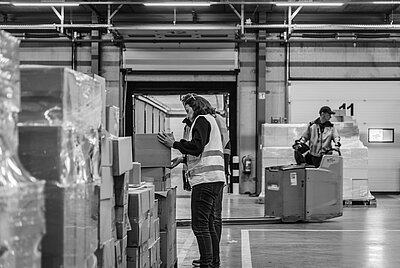The challenges in the supply chain in 2022
“Like most businesses, we are experiencing fluctuations in our supply chains and logistics that are not easily solved,” says Peter. “We have lots of sales coming through, but we also have staff vacancies. This presents us with a logistics challenge when it comes to fulfilling those orders.”
And what Peter describes isn’t unique to Worldpack. The world is experiencing a labour shortage on a scale it’s never seen before. In early 2022, there were 1.2 million open job roles in Europe alone. This increasing pressure on businesses to keep up with demand is just one of the issues facing the supply chain this year.
The labour shortage doesn’t just affect your own workforce, but the workforces of people you rely on up and downstream within your supply chain.
“The value of our last mile delivery has been reduced because there aren’t enough quality drivers to complete the order,” explains Peter. “This contributes to longer lead and transit times, which in turn reduces the quality of service we can give to our customers.”
Daily price increases because of material shortages and inflation also mean that buying more stock in one go is suddenly back on the table after decades of lean supply chains with stable stock and prices. This switch to the supply chain of the past is making life difficult for businesses.
Buying more stock increases the risk for business but also makes it harder for buyers and forecasters to anticipate what is needed. Buying large quantities upfront will help to keep costs stable but there is a danger that businesses will buy more than they need and end up with stock they struggle to store and sell.
“In some of our product lines and raw materials, we now have a year’s worth of stock on our shelves in the warehouse,” says Peter. “It puts pressure on the warehouse capacity and on the buyers, but we think it’s important to be able to fulfil customers’ needs.”
A winning strategy: efficiency & sustainability
Despite the challenges, there are opportunities that will enable businesses to balance the supply chain and bring back stability.
Consumers are growing more and more discerning about how they buy their products and who they buy from. According to this Capgemini report, 79% of consumers are changing purchase preference based on the social responsibility, inclusiveness or environmental impact of their purchases.
“We see our clients wanting and demanding more sustainable stock,” comments Peter. “Worldpack is currently working on a line of plastic packaging that contains 50% recycled plastic content.”
And this presents an opportunity for businesses in 2022. Unilever reports that its Sustainable Living Brands (including Dove, Hellman’s and Domestos) are growing 69% faster than the rest of the business and delivering 75% of the company’s growth. Building sustainability into your supply chain is good for the environment and for business.
And the opportunities don’t simply lie in the products you are buying and supplying, as Peter points out. “We are working on processes inside the warehouse to reduce the amount of filling materials that go into packing boxes and ensuring our customers have accurate box sizing to save on waste,” he says. “We’re also committing to using delivery companies that have electric vehicles and are dedicated to reducing emissions.”
Worldpack is also working hard to improve internal logistics – overhauling how people load the fleet of vehicles at our warehouse and improving the loading stations themselves. Bigger containers in the warehouse mean less journeys to locate stock and fulfil orders and wall-mounted loading racks save space and increase efficiency.
Key considerations to help you manage the supply chain challenges include being creative with solutions and working with forward thinking suppliers and partners. The more communication the better, as time and information about your requirements in advance give you and them the best chance to put plan B or C in place. Let’s weather the supply chain challenges together.
If you’d like help sourcing sustainable GNFR goods or increasing the stability of your supply chain, speak with one of our account managers today +31(0) 88 494 20 80 or email online@worldpack.eu


